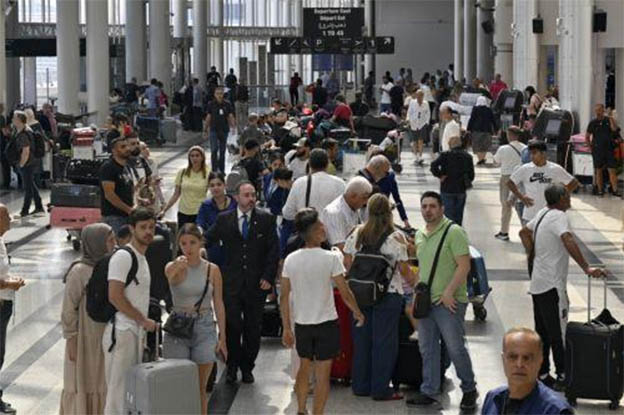Germany was preparing to evacuate thousands of its nationals from Lebanon and elsewhere in the Middle East via Cyprus on Tuesday, amid concerns over an escalation of the conflict between Israel and Iran.
Germany’s armed forces (Bundeswehr) have been readying a small fleet of A400M transport aircraft at the Wunstorf Air Base in Lower Saxony that could shuttle people from Beirut to Cyprus as is necessary, according to German news outlets.
In addition, the navy is also being prepared, the German News Agency (DPA) reported, with the project mainly involving German citizens who, despite repeated appeals, remain in Lebanon.
Meanwhile, the German foreign ministry announced there were now 2,100 Germans registered in Lebanon on the precautionary list of citizens in the event of crises, when until last week there had only been 1,300.
It is unknown whether some of those registered have already left Lebanon after the ministry’s urgent warnings, the German ministry said.
As far as an operation by sea is concerned, the frigate Hamburg could be enlisted, which is currently south of Greece, and is on its way to the Red Sea, where it will take part in an operation.
Elsewhere Lufthansa group has cancelled all flights to Tel Aviv, Beirut and Tehran until August 12. Initially, flights to Tel Aviv were cancelled until August 8. There are also no services to Amman, Jordan, and Erbil, Iraq, until August 7, the company announced.
Airlines belonging to the Lufthansa group, including Swiss and Austrian Airlines, will also avoid Iranian and Iraqi airspace until August 7.
According to earlier statements by deputy government spokesperson Yiannis Antoniou, to the Cyprus Mail, the Estia planhas not yet been officially activated in Cyprus.
The Estia plan is the state’s existing plan to deal with mass evacuation events of European Union and third country nationals from neighbouring countries.
“We haven’t received any request from other countries to activate the Estia plan yet,” Antoniou said.
“However, we are ready to activate it at any given moment.”
The plan swings into action whenever other countries request to use Cyprus as a hub for evacuations, with hundreds or thousands of people then passing through.
On Monday, government spokesman Konstantinos Letymbiotis said the transfer of Israeli citizens via ships from Cyprus into Israel is not part of the Estia plan.
His statement came after Israeli Transport Minister Miri Regev had announced plans to operate “maritime shuttles” from Cyprus to Israel to help Israeli citizens who wish to travel to the country from abroad to do so, as heightened tensions in the Middle East have seen many airlines reduce their services to the region.
Elsewhere, the Swedish Embassy confirmed it has temporarily moved its mission to the island from Lebanon, due to the deteriorating security situation in the region.
The move is valid for the month of August but may be extended, the embassy told the Cyprus News Agency.
It said it had received instructions from the Swedish foreign ministry to remove staff to safety on August 1.
“The ministry of foreign affairs is closely monitoring the events and the security situation is under constant assessment,” Deputy Head of mission Bengt Baedecke told CNA.
Airport operator Hermes’ director of aviation development and communication Maria Kouroupi said Cyprus’ airports “are prepared to manage any potential influx of passengers resulting from the current situation in the Middle East”.
In statements made on CyBC on Tuesday, she said that flight schedules to and from Israel and Lebanon are being adjusted daily.
Kouroupi also added that, so far, two to three special flights have been conducted to evacuate a small number of individuals from Lebanon, mainly embassy personnel.
“Several flights to and from Israel and Lebanon have been cancelled, while 14 flights continue to operate daily. Israeli airlines and one European airline are maintaining their schedules,” she said.
Kouroupi added that since August 2, flight cancellations and rescheduling have affected around 10,000 passengers.
“There is a tense calm,” she said. “It is difficult to predict what will happen and how it will affect us. The airports are involved and ready to handle any passenger flow.
“Our goal is to ensure that all other flight schedules continue smoothly, for Cyprus to remain a safe destination, and we hope for a return to normalcy in our region,” Kouroupi said.








Click here to change your cookie preferences